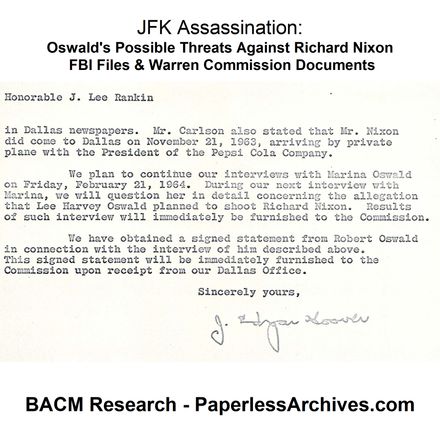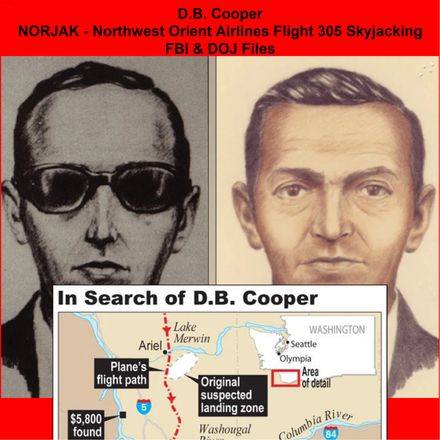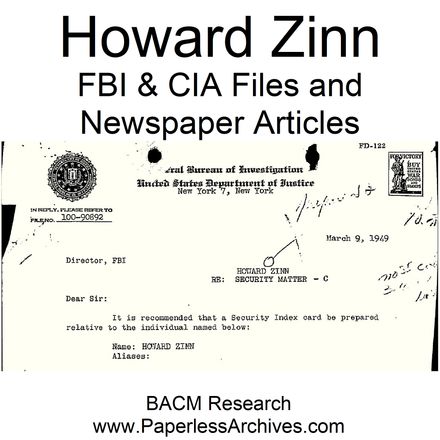Starting from:
$12.95
Home
Organized Crime
Ruggiero Boiardo - Newark "Godfather" FBI Files & Congressional Material - Download
Ruggiero Boiardo - Newark "Godfather" FBI Files & Congressional Material - Download
Ruggiero Boiardo - Newark "Godfather" FBI Files & Congressional Material
Ruggiero Boiardo (1890–1984), nicknames "Diamond Richie" and "Richie the Boot", was a legendary and powerful capo of the Genovese crime family who ran mob operations in the Newark, New Jersey area.
FBI Files
1,150 pages of FBI files covering Ruggiero Boiardo.
The files date from 1953 to 1984. About 45 pages were not declassified until November 2017.
Highlights include:
A continuously updated investigative report summarizing his personal history and background, criminal activities, legitimate and illegitimate business activities, associates such as Henry Abrams, Joseph Accardi, Louis Buchalter, Al Capone, Antonio Rocco Caponigro, Also known as "Tony Bananas", Angelo De Carlo, Jacob Shapiro, Anthony "Little Pussy" Russo and John "Big Pussy" Russo, Boiardo's criminal record, dissolution of his relationship with Abner "Longie" Zwillman over stolen bootleg alcohol, his involvement with Harrison Fuel Inc., and other developments over the years.
A memo contains a summary of an FBI interview with Boiardo, in which he mentions his dealings as a bootlegger during prohibition, and his surprise that Vito Genovese got involved in drug rackets.
Files show that there were at least twelve informants giving information on Boiardo. Five of these informants were close enough to Boiardo to report on the minutia of his daily activities and thoughts.
Files include transcripts from the bugging of John "Big Pussy" Russo.
Reports from informants saying that Boiardo believed he was the basis for the main character in the Mario Puzo book, "The Godfather." An account that in 1974 he erected a sign in his tomato garden that read "The Godfather's Garden."
Informant's account of Boiardo's views on the changes in the numbers racket in Newark, based on the city's changing racial makeup. Speculation over who was in control, Richie Boiardo or his son.
Informants passed on Boiardo's various comments dealing with politics, race relations, the George Wallace campaign, Nixon's impeachment, and his philosophical justification for gangland killings.
CONGRESSIONAL MATERIAL
570 pages of congressional material touching upon Boiardo including the reporting of a Senate Judiciary Committee Hearing on Organized Crime 1983.
ABOUT RUGGIERO BOIARDO
Ruggiero Boiardo was born on November 8, 1890, in Naples, Italy (some documents show the date of his birth to be December 8, 1890). Ruggiero Boiardo was also known as Richie Boiardo, and Richie "The Boot" Boiardo. While working as a milkman in 1910, he began a small bookmaking operation. As a young man he had a reputation as a flashy dresser, often wearing a diamond belt buckle for which he paid $10,000. He also had a reputation for brutality in his street dealings.
Boiardo became the leader of a gang in Newark's Italian First Ward, engaging in numerous illegal operations. During prohibition he ran a bootlegging operation. This led to a battle in the early 1930's for control of the Newark rackets with gangster Abner "Longie" Zwillman. During the battle, Richie Boiardo survived an attack in which he was shot 12 times. It is believed that Al Capone came to Newark to help settle the differences between the two sides. The war between Richie "The Boot" Boiardo and Abner "Longie" Zwillman chilled over the next few years. Boiardo forged a relationship with Lucky Luciano and was brought into the Genovese Family as a Capo. When Abner Zwillman was murdered in 1959, Boiardo had solid control of Newark, New Jersey.
Boiardo lived on a sprawling estate in Livingston, New Jersey. In a 1970's Life magazine photo spread, the mansion was described as "Transylvanian traditional." Beyond the amenities one would expect to find on such an estate, was a trash furnace on the property's grounds. It is Gangland lore that Boiardo used this furnace as his private crematorium, to dispose of bodies of his enemies. In his later years he would spend much of his time tending to the estate's vegetable garden.
In April 1969, Richie Boiardo was convicted of conspiracy to violate gambling laws. Accordingly, Boiardo was sentenced to 2 ½ - 3 years in State Prison and fined $1,000. He was incarcerated on November 18, 1970 at the New Jersey State Prison, Leesburg, New Jersey. The Boiardo family's association with Newark's Mayor Hugh Addonizio led to Addonizio's conviction, in 1969, on racketeering charges. This eliminated Addonizio as a contender to become the next governor of the State of New Jersey. Addonizio was sentenced to ten years and served 5 years and 2 months in a federal prison. The same federal grand jury that returned an indictment against Addonizio, also indicted 14 others including Richie Boiardo's son Anthony Boiardo, also known as "Tony Boy" Boiardo. The younger Boiardo is believed to have been in control of the Newark underworld at the time. During the criminal proceedings Tony Boy suffered a heart attack. He was never found by the courts to be healthy enough to stand trial on his extortion and conspiracy charges.
Richie Boiardo believed that he was the model for the character, Don Vito Corleone, in Mario Puzo's book The Godfather. In 1972, the Godfather was released as an Academy Award winning film by Francis Ford Coppola, staring Marlon Brando. Boiardo would often point to similarities between his life and that of Don Vito Corleone. In 1974, Boiardo erected a sign in his vegetable garden that read, "The Godfather's Garden."
On Good Friday of 1978, Tony Boy Boiardo suffered another heart attack, he died on April 20, 1978, Ruggiero Boiardo died in November 1984 at the age of 95.
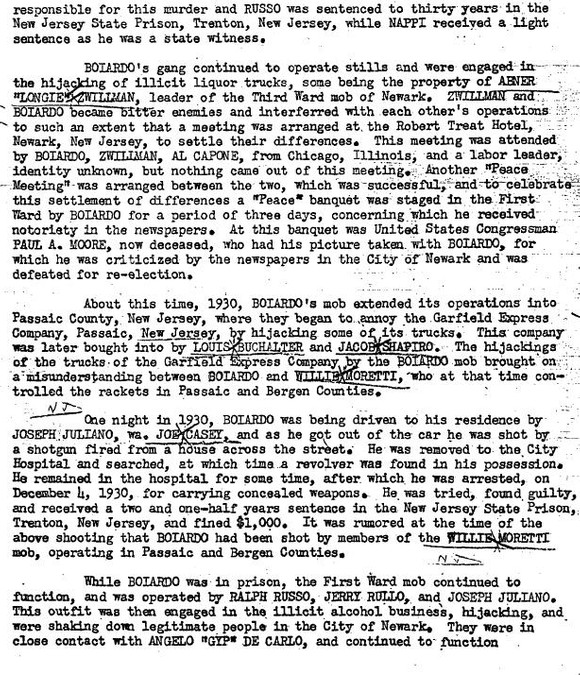

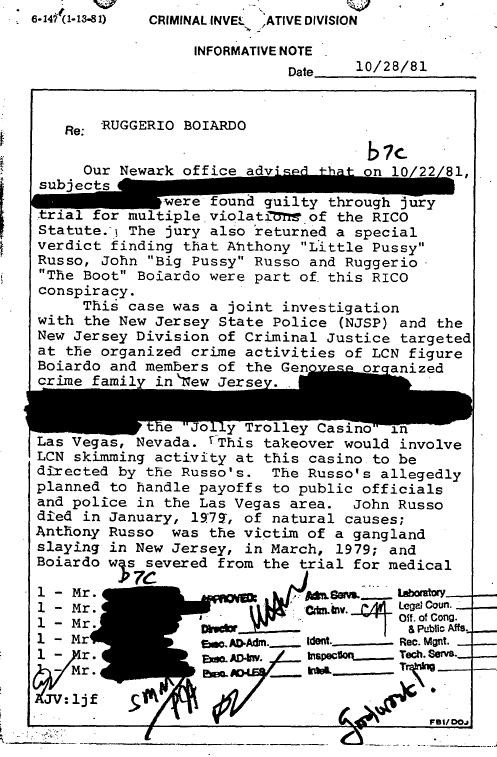
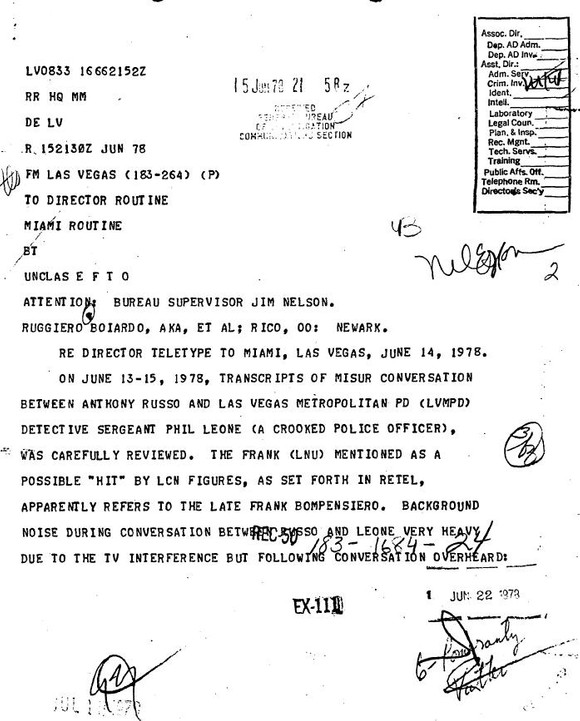

Ruggiero Boiardo (1890–1984), nicknames "Diamond Richie" and "Richie the Boot", was a legendary and powerful capo of the Genovese crime family who ran mob operations in the Newark, New Jersey area.
FBI Files
1,150 pages of FBI files covering Ruggiero Boiardo.
The files date from 1953 to 1984. About 45 pages were not declassified until November 2017.
Highlights include:
A continuously updated investigative report summarizing his personal history and background, criminal activities, legitimate and illegitimate business activities, associates such as Henry Abrams, Joseph Accardi, Louis Buchalter, Al Capone, Antonio Rocco Caponigro, Also known as "Tony Bananas", Angelo De Carlo, Jacob Shapiro, Anthony "Little Pussy" Russo and John "Big Pussy" Russo, Boiardo's criminal record, dissolution of his relationship with Abner "Longie" Zwillman over stolen bootleg alcohol, his involvement with Harrison Fuel Inc., and other developments over the years.
A memo contains a summary of an FBI interview with Boiardo, in which he mentions his dealings as a bootlegger during prohibition, and his surprise that Vito Genovese got involved in drug rackets.
Files show that there were at least twelve informants giving information on Boiardo. Five of these informants were close enough to Boiardo to report on the minutia of his daily activities and thoughts.
Files include transcripts from the bugging of John "Big Pussy" Russo.
Reports from informants saying that Boiardo believed he was the basis for the main character in the Mario Puzo book, "The Godfather." An account that in 1974 he erected a sign in his tomato garden that read "The Godfather's Garden."
Informant's account of Boiardo's views on the changes in the numbers racket in Newark, based on the city's changing racial makeup. Speculation over who was in control, Richie Boiardo or his son.
Informants passed on Boiardo's various comments dealing with politics, race relations, the George Wallace campaign, Nixon's impeachment, and his philosophical justification for gangland killings.
CONGRESSIONAL MATERIAL
570 pages of congressional material touching upon Boiardo including the reporting of a Senate Judiciary Committee Hearing on Organized Crime 1983.
ABOUT RUGGIERO BOIARDO
Ruggiero Boiardo was born on November 8, 1890, in Naples, Italy (some documents show the date of his birth to be December 8, 1890). Ruggiero Boiardo was also known as Richie Boiardo, and Richie "The Boot" Boiardo. While working as a milkman in 1910, he began a small bookmaking operation. As a young man he had a reputation as a flashy dresser, often wearing a diamond belt buckle for which he paid $10,000. He also had a reputation for brutality in his street dealings.
Boiardo became the leader of a gang in Newark's Italian First Ward, engaging in numerous illegal operations. During prohibition he ran a bootlegging operation. This led to a battle in the early 1930's for control of the Newark rackets with gangster Abner "Longie" Zwillman. During the battle, Richie Boiardo survived an attack in which he was shot 12 times. It is believed that Al Capone came to Newark to help settle the differences between the two sides. The war between Richie "The Boot" Boiardo and Abner "Longie" Zwillman chilled over the next few years. Boiardo forged a relationship with Lucky Luciano and was brought into the Genovese Family as a Capo. When Abner Zwillman was murdered in 1959, Boiardo had solid control of Newark, New Jersey.
Boiardo lived on a sprawling estate in Livingston, New Jersey. In a 1970's Life magazine photo spread, the mansion was described as "Transylvanian traditional." Beyond the amenities one would expect to find on such an estate, was a trash furnace on the property's grounds. It is Gangland lore that Boiardo used this furnace as his private crematorium, to dispose of bodies of his enemies. In his later years he would spend much of his time tending to the estate's vegetable garden.
In April 1969, Richie Boiardo was convicted of conspiracy to violate gambling laws. Accordingly, Boiardo was sentenced to 2 ½ - 3 years in State Prison and fined $1,000. He was incarcerated on November 18, 1970 at the New Jersey State Prison, Leesburg, New Jersey. The Boiardo family's association with Newark's Mayor Hugh Addonizio led to Addonizio's conviction, in 1969, on racketeering charges. This eliminated Addonizio as a contender to become the next governor of the State of New Jersey. Addonizio was sentenced to ten years and served 5 years and 2 months in a federal prison. The same federal grand jury that returned an indictment against Addonizio, also indicted 14 others including Richie Boiardo's son Anthony Boiardo, also known as "Tony Boy" Boiardo. The younger Boiardo is believed to have been in control of the Newark underworld at the time. During the criminal proceedings Tony Boy suffered a heart attack. He was never found by the courts to be healthy enough to stand trial on his extortion and conspiracy charges.
Richie Boiardo believed that he was the model for the character, Don Vito Corleone, in Mario Puzo's book The Godfather. In 1972, the Godfather was released as an Academy Award winning film by Francis Ford Coppola, staring Marlon Brando. Boiardo would often point to similarities between his life and that of Don Vito Corleone. In 1974, Boiardo erected a sign in his vegetable garden that read, "The Godfather's Garden."
On Good Friday of 1978, Tony Boy Boiardo suffered another heart attack, he died on April 20, 1978, Ruggiero Boiardo died in November 1984 at the age of 95.





1 file (102.2MB)

